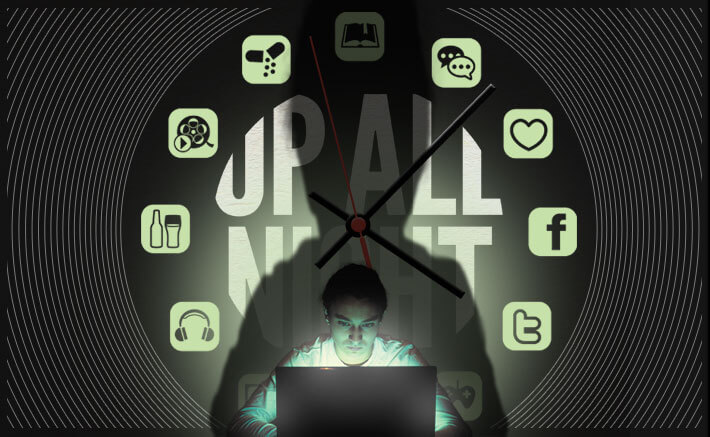EYES WIDE OPEN
Moving in day came early last fall, or at least that’s how it felt for Jeremy, who came back to campus for his second year a little wiser. Sleep deprivation, common among first year college students adjusting to the stress and social activities of college life, had taken its toll the previous year and not just on his grades. He was exhausted—mentally and physically.
“Most students go to sleep later, whether it’s to do work for school or partying,” he says. And for Jeremy, who lived with five other guys, there was a little bit of everything. Jeremy says most students in his dorm stay up till 2 a.m., seven days a week.
Jeremy would stream movies on Netflix through his computer, talk with friends from home on Facebook or catch up on sporting events he missed while he was at class, all things he regularly did in high school. One of his roommates would stay up sometimes til 3 a.m. video chatting and texting with an out-of-state girlfriend, which he also did when they lived only three blocks apart. Another would play Xbox Live and connect with someone in a different time zone if there was no one around in his dorm, also something he did throughout high school. These late nights were nothing new for any of them.
While eight to nine hours of sleep per night is widely recommended for students, many tempted by technology and the constant social connection supported by smart phones are finding it increasingly difficult to disconnect at night, according to Sarah Ogden, a math teacher at Earl L. Vandermeulen High School in Port Jefferson.
“I have heard stories of kids not being able to fall asleep because of texting all night or because of video games they’re addicted to,” she says. “Constantly texting and checking Facebook, Twitter…instilled this need for students to be connected all the time. They’re not fully sleeping as long as their phones aren’t turned off or on silent.”
Ogden also attributes sleep deprivation to after-school activities that can consume much of the limited time a student has to not only complete assignments but to get a good night’s sleep. Inevitably, students are either too exhausted or lack the necessary amount of time to complete their assignments, which has been a major problem for 17-year-old Ashley of New Hyde Park, who struggles with balancing softball, afterschool clubs, volunteer work and AP classes in her junior year of high school.
“It’s a complete balancing act trying to fit everything in the day sometimes,” she says. “Sometimes I’m up till three or four [in the morning] just doing homework or studying for a test.”
Ashley says softball keeps her out till 10 p.m. some nights, between mandatory after-school practice and then private pitching lessons she takes on her own. Many students are often forced to choose between their recreational passions, their academic drive and their quality of sleep. For Ogden the effects of sleep deprivation are noticeably detrimental to a student’s performance at school.
“Homework is not always completed,” Ogden says. “If a student has work the night before, or didn’t get home from a game, practice, dance, etc. until after nine or 10, then to get focused and start studying is very difficult. What I see among students is that without enough sleep, they are not learning or working to their full potential.”
Jeremy says during his freshman year of college he had a hard time focusing and would fall asleep occasionally during lectures—something that happened to him in high school, but still left him able to swing a solid B grade point average, that Jeremy admits could have been an A.
“If you’re falling asleep in class like I was in high school, you’re probably not going to be doing too well or at least not as well as you should be doing,” he says. Jeremy’s sleeping patterns from high school carried over to college, with one major difference—the grades that came easy to Jeremy in high school weren’t coming so easily anymore and for the first time his report card had letters he had never seen before—Cs and Ds.
“Right away I knew I had to do something,” he says. “But I knew I couldn’t go from sleeping at four in the morning to going to bed at 10 at night.”
He decided next semester he would try to get later classes, so he could at least sleep later while he was trying to adjust his sleeping habits and not be as tired during class.
In 1997 the University of Minnesota conducted research that compared students who went to school at 7:15 a.m. with those who went to school at 8:40 a.m. They found that students who went to school at 8:40 got higher grades and more sleep on weekday nights.
Jeremy passed over the 7:30 and 8 a.m. classes and signed up for later ones—those at 9:30 a.m. or later, an option not given to most high school students, which in the past has led some districts to consider later school day start times. On Long Island, school typically starts around 7 a.m. But by adjusting a given district’s early start time, there is what Ogden refers to as a “domino effect” with after-school activities.
“With the possibility of a later start time, athletics and extracurricular activities would have to be pushed back, so at five during the fall, students will be playing an outdoor soccer game in the dark,” she says. “The agenda of any school is how to best serve its students; ultimately we need to look at the research and plan accordingly as educators.”
For Ashley, a later start time is an impossibility with her schedule, which already runs too late into the night.
“It would mess everything up,” she says. “I just have to suck it up so I can get into the college I want and hopefully I will have more flexibility then. For now, I have to deal with being tired.”
Faced with an ever-increasing amount of competition for college acceptance, it’s a route many high school students are taking because they believe being tired now will be worth it in the end. But doctors say the consequences go way beyond just being tired.































